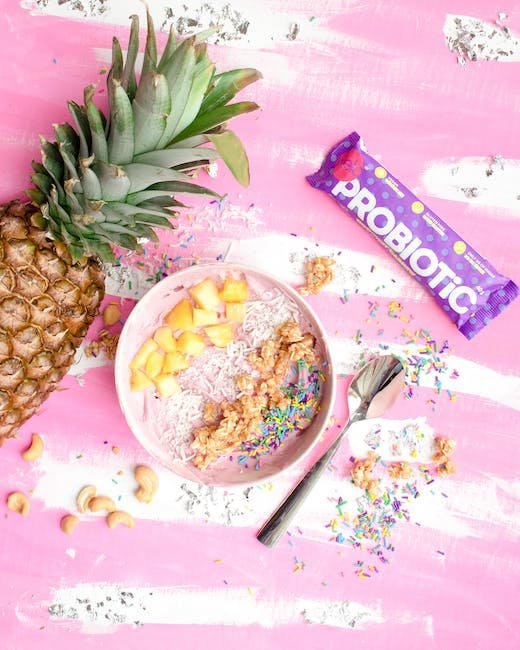The delicate dance between science and nature has led us to uncover countless solutions that cater to the well-being of our little ones. As we strive to provide the very best for their growth and development, an intriguing player has emerged on the stage of infant nutrition: probiotics. These microscopic superheroes have captured the attention of scientists and parents alike, captivating their imaginations with promises of enhanced immune systems, improved digestion, and a myriad of other health benefits. In this article, we will immerse ourselves in the fascinating world of probiotics and explore their role in the realm of baby formula. From deciphering the science behind these friendly bacteria to understanding their potential impact on infant health, we embark on a journey that may forever change the way we nourish our little miracles.
Table of Contents
- The Importance of Probiotics in Infant Health
- Understanding the Benefits of Adding Probiotics to Baby Formula
- Choosing the Right Probiotics for Your Baby’s Formula
- Expert Recommendations on Probiotics for Infants
- Ensuring Safe and Effective Use of Probiotics in Baby Formula
- Q&A
- In Conclusion

The Importance of Probiotics in Infant Health
The well-being of infants is a top priority for parents and caregivers, and one area that has garnered increasing attention is the role of probiotics in promoting infant health. Probiotics are live bacteria and yeast that provide numerous health benefits, particularly for the digestive system. Incorporating probiotics into an infant’s diet can help establish a healthy gut flora, which not only aids in digestion but also strengthens the immune system.
Probiotics assist in breaking down food and absorbing nutrients, ensuring that infants receive the necessary nourishment for growth and development. By maintaining a balanced gut microbiome, probiotics also contribute to reducing colic, reflux, and constipation in infants. Furthermore, research suggests that probiotics can alleviate common digestive issues associated with formula feeding, such as diarrhea and abdominal discomfort.
It is important to note that not all probiotic strains are suitable for infants, and a healthcare professional should be consulted before starting any supplementation. The best sources of probiotics for infants are usually found in certain types of breast milk, as well as specialized infant formulas fortified with beneficial bacteria. These products undergo rigorous quality control to ensure safety and effectiveness.
In conclusion, probiotics play a vital role in promoting optimal infant health. By supporting proper digestion, bolstering the immune system, and easing common digestive discomforts, probiotics offer a natural and safe way to enhance the well-being of our little ones. With the guidance of healthcare professionals, parents can incorporate probiotics into their child’s routine to lay the foundation for a healthy start in life.

Understanding the Benefits of Adding Probiotics to Baby Formula
When it comes to providing the best nutrition for your little one, adding probiotics to their baby formula can offer a range of benefits that you may not be aware of. Probiotics are live beneficial bacteria that can promote a healthy gut and support overall digestive health. Here are a few reasons why you should consider incorporating probiotics into your baby’s formula:
- Boosting the immune system: Probiotics help strengthen your baby’s immune system, protecting them against harmful pathogens and potentially reducing the risk of infections.
- Relieving digestive issues: If your baby struggles with common digestive problems such as colic, constipation, or diarrhea, probiotics can help restore a healthy balance of bacteria in their gut and alleviate these discomforts.
- Improving nutrient absorption: Probiotics can enhance the digestion and absorption of nutrients from breast milk or formula, ensuring that your baby receives the maximum benefits from their feedings.
It’s essential to note that not all probiotics are created equal, so it’s crucial to select a formula that contains strains specifically designed for infants. Always consult with your pediatrician before considering any changes to your baby’s diet. By incorporating probiotics into their formula, you can support your baby’s overall well-being and contribute to their healthy growth and development.

Choosing the Right Probiotics for Your Baby’s Formula
Your baby’s digestive health is important, and choosing the right probiotics for their formula can offer numerous benefits. Probiotics are live bacteria that promote a healthy gut by improving digestion and boosting the immune system. When selecting probiotics for your baby, there are a few key factors to consider:
1. Strain Selection:
Look for specific strains that are known to be beneficial for infants, such as Lactobacillus rhamnosus or Bifidobacterium infantis. These strains have been extensively studied and shown to support a healthy digestive system in babies.
2. CFU Count:
CFU stands for Colony Forming Units, which indicates the number of viable bacteria in a probiotic product. Opt for infant formulas that contain a sufficient CFU count, preferably around 1-3 billion, to ensure your baby receives an adequate amount of probiotics.
3. Safety and Quality:
Ensure that the probiotic product you choose is safe for infants and meets strict quality standards. Look for trusted brands that provide third-party testing, ensuring the product is free from contaminants and allergens.
Remember, it’s always best to consult with your pediatrician or healthcare provider before introducing probiotics into your baby’s formula. They can provide personalized recommendations based on your baby’s unique needs and health history. By choosing the right probiotics for your baby, you can support their digestive health and overall well-being.

Expert Recommendations on Probiotics for Infants
Ensuring the health and well-being of infants is a top priority for parents and caregivers. One area of interest is the use of probiotics, which are beneficial bacteria that can support the development of a healthy gut microbiome. While consulting with healthcare professionals is crucial, here are some :
- Choose the right strains: Look for probiotic products specifically formulated for infants, containing strains like Bifidobacterium infantis, Bifidobacterium breve, or Lactobacillus reuteri. These strains are known to be safe and beneficial for infants.
- Consider health conditions: If your baby has specific health conditions, such as colic or eczema, consult with a healthcare provider who can recommend strains targeted to address those issues.
- Start slow: Introduce probiotics gradually, following recommended dosages. This helps monitor any potential reactions or sensitivities.
- Quality matters: When choosing probiotics, opt for reputable brands that provide detailed information about their product’s quality, manufacturing processes, and storage requirements.
- Seek professional advice: Every baby is unique, so it’s vital to consult with a pediatrician or a healthcare professional knowledgeable about infant nutrition before incorporating probiotics into your baby’s routine.
Remember, expert recommendations and individual medical needs may vary. It’s essential to make informed decisions based on professional advice and closely monitor your baby’s response to probiotic supplementation.
Ensuring Safe and Effective Use of Probiotics in Baby Formula
In recent years, there has been growing interest in the incorporation of probiotics into baby formula to promote gut health and overall well-being in infants. Probiotics are live microorganisms that, when administered in adequate amounts, confer a health benefit on the host. While the potential benefits of probiotics in baby formula are promising, it is crucial to ensure their safe and effective use.
To guarantee the safety of probiotics in baby formula, manufacturers must adhere to strict quality control measures. This involves conducting vigorous testing and screening of probiotic strains to ensure they are safe for consumption by infants. Additionally, stringent manufacturing processes must be followed to guarantee the absence of harmful contaminants. Regular monitoring and auditing of production facilities are essential to maintain consistent quality standards.
- Choosing the right probiotic strains: Not all probiotics are created equal. Different strains have varying health benefits and safety profiles. It is crucial for manufacturers to select probiotic strains that have been scientifically proven to be safe and effective for infants.
- Determining appropriate dosage: The dosage of probiotics in baby formula must be carefully determined to ensure optimal health benefits without risking any potential adverse effects. Extensive research and clinical trials are conducted to establish the appropriate dosage for each strain used.
- Evaluating long-term effects: Continuous monitoring and studies are essential to assess the long-term effects of probiotics in baby formula. It is important to evaluate the impact on growth, immune function, and the development of the gastrointestinal system to ensure no unforeseen risks arise.
By prioritizing safety and efficacy in the use of probiotics in baby formula, we can offer parents a reliable and trusted option to support their infant’s health and well-being. Rigorous quality control, careful strain selection, appropriate dosing, and ongoing research are paramount in ensuring the safe and effective incorporation of probiotics into baby formula.
Q&A
What are probiotics?
Probiotics are live bacteria and yeasts that are beneficial to our health, particularly for our digestive system. They help maintain a healthy balance of gut bacteria and support overall well-being.
Are probiotics safe for babies?
Probiotics are generally considered safe for babies when administered as directed. However, it is always best to consult with a healthcare professional before introducing any new supplements or formula to your baby’s diet.
How can probiotics benefit babies?
Probiotics have been linked to various benefits for babies, including improving digestion, strengthening the immune system, and potentially reducing the risk of certain allergies and infections.
What role do probiotics play in baby formula?
Probiotics are often added to baby formula to mimic the natural probiotics found in breast milk. They help promote a healthy gut environment, aid digestion, and contribute to overall gut health for babies who are not exclusively breastfed.
Do all baby formulas contain probiotics?
No, not all baby formulas contain probiotics. Probiotics are typically found in specific baby formula brands, so it’s important to read the labels carefully if you are interested in purchasing formula with added probiotics.
Can probiotics cause any side effects in babies?
While probiotics are generally safe for babies, some rare cases have reported minor side effects such as bloating or gas. If you notice any unusual symptoms in your baby after introducing probiotics, it’s advised to consult a healthcare professional.
Are probiotics a replacement for breastfeeding?
No, probiotics should not be viewed as a replacement for breastfeeding. Breast milk offers numerous benefits beyond probiotics, so if possible, it is recommended to exclusively breastfeed for the first six months of a baby’s life.
When should probiotics be introduced to a baby’s diet?
The introduction of probiotics to a baby’s diet should be discussed with a pediatrician. In some cases, probiotics may be recommended immediately after birth, while for others, it may be later based on the baby’s individual needs and health conditions.
Can probiotics be used to treat specific conditions in babies?
Probiotics have shown promise in certain situations, such as reducing the severity of colic or helping with diarrhea caused by antibiotics. However, it is crucial to consult with a healthcare professional before using probiotics as a treatment for any specific condition.
In Conclusion
As we conclude our exploration into the fascinating world of probiotics in baby formula, it becomes clear that the symbiotic relationship between these tiny live organisms and our little ones holds immense potential. We embarked on a journey to understand the role of probiotics in helping nurture and protect our precious infants, and what we discovered is truly remarkable.
From the very first moments of life, when a newborn enters this world, an intricate dance commences within their delicate bodies. The trillions of microorganisms, including helpful bacteria, that inhabit their gut become key players in the symphony of growth and development. And here, the role of probiotics emerges like a maestro, conducting it all with precision and harmony.
We have delved into the crucial benefits that these friendly bacteria bring to the table – improved digestion and nutrient absorption, strengthened immune response, and reduced risk of certain ailments. Their ability to create a robust shield against harmful pathogens while stimulating the release of essential nutrients is nothing short of extraordinary. But it doesn’t end there.
Through extensive research and development, scientists have endeavored to mimic nature’s wisdom, blending the goodness of probiotics with baby formula, designed specifically to nourish our little ones. This exciting leap in innovation has opened doors to wider accessibility, allowing parents to provide their infants with the wonders of probiotics, even in the absence of breastfeeding.
Holistic health begins with the tiniest building blocks, and probiotics have proven to be an integral component. Harnessing their potential in baby formula is a groundbreaking step towards a brighter future for our children. However, it is important to remember that though the benefits are numerous, each infant’s needs are unique, and consultation with healthcare professionals is necessary to make informed decisions.
As we bid farewell to this exploration, we leave you with the knowledge that probiotics hold great promise for our little ones. It is an invitation to embrace the wonders of science and nature, hand in hand, as we navigate the intricate web of early life nutrition. The role of probiotics in baby formula is an awe-inspiring fusion, fostering the growth and well-being of our children, ensuring a solid foundation for the wonderful journeys that lie ahead.
As an affiliate, my content may feature links to products I personally use and recommend. By taking action, like subscribing or making a purchase, you’ll be supporting my work and fueling my taco cravings at the same time. Win-win, right?
Want to read more? Check out our Affiliate Disclosure page.